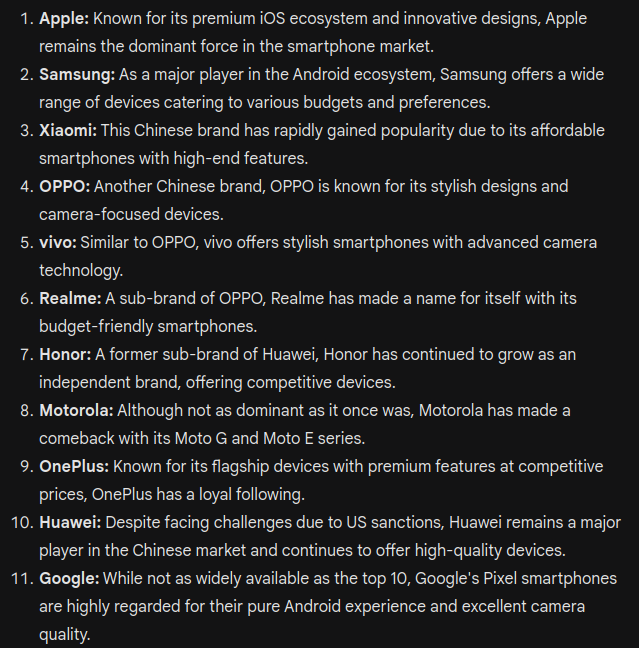The next phase of the race between generative AIs has already begun, and it doesn't even mean new major version releases. Who said AIs would run out of quality data to train on by the turn of the decade might be very wrong...
I saw a few days ago a commercial about the newest Google Pixel smartphone now including Gemini AI. currently considered the most powerful generative AI in the world (we were just talking about ChatGPT being the most powerful one a short while ago).
I thought at the time that I should check into this topic and see how this would impact the market, and see what the competition does.
First, I was curious to see where Google stands in the smartphone market. I had to repeat the question a few times and extend the range, as I didn't expect it to be SO low. But here are the result, from Gemini AI nonetheless (a screenshot):

Ouch! 11th spot? That probably doesn't look good at Google's headquarters. What's worse for them is that Top 10 is filled with similar or sub-brands of other Chinese brands, also above.
Probably integrating Gemini into their smartphones is a way to try to make them more desirable, but also as a way to collect a ton more data to train on. As it took 1st place from ChatGPT, it was great timing to market this, and I've seen it mentioned in the commercial that Gemini is number 1.
Either way, ChatGPT is not standing still either. None other than Apple will upgrade Siri to a ChatGPT-powered version, as described in this article. ChatGPT will be integrated into the newest versions of phone, tablet and OS. Interesting moves! Microsoft and Apple collaborating... Even via Open AI...
I think Samsung may have been caught on the wrong foot for the time being. They haven't integrated any generative AI yet, although they have AI capabilities in their Galaxy series.
Curious to see what the Chinese will do about this. They obviously have their own generative AIs in China (public or not, I haven't checked). The question is would they integrate them into their smartphones? Do they trust them to censor themselves in all situations on the internal market? Can this be another vulnerability on western markets?
The biggest impact in my opinion is not on the user experience and making AI image user friendly, as opposed to the image created in many Hollywood movies.
It will be on the amount of data collected and interpreted by these models via the smartphones. From geolocation, movement sensors, and access to camera and microphone, plus all the questions and requests from all the smartphone users, these open up many possibilities. Imagine if next they'll be added to health-monitoring watches. I don't know what restrictions they'll have and if they will be respected as set by the user or by default, and I'm sure there will be many debates. I'm also sure more and more access will be granted to AIs as they prove their usefulness. Thus more access to larger quantities of data, some useful others not, and some highly personal. But probably better than synthetic data. On the other side, what will privacy become in the not so distant future? A vague memory, probably. @vimukthi shared with me and my readers a few days ago a chart where 29% of the young people would be ok if the government would install surveillance cameras in their homes (reason given is irrelevant). Maybe we're trying to cling on to something that will only exist in our imagination or memory or if we drop off the grid in a few years: privacy.
Posted Using InLeo Alpha


